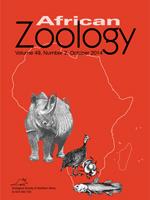Generally, Wahlberg's epauletted fruit bat (Epomophorus wahlbergi) roost in trees or under the eaves of buildings. This study investigated the roosting dynamics of E. wahlbergi in the urban environment of Pietermaritzburg, South Africa. To determine roost fidelity bats were radio-tracked to daytime roosts. Bats were found to change their daytime roosts regularly, and would change more frequently during winter than spring. Roost temperatures were measured by placing i-Button® temperature loggers at known roosts, either in man-made structures or vegetation. Temperatures varied across different roosts, but roost temperatures were generally higher than ambient temperatures. Roosts in man-made structures had higher temperatures than those in natural vegetation. This study showed the importance of temperature in E. wahlbergi daytime roosts, although other factors such as reproduction and social interactions, predator avoidance and proximity to food resources are likely to also affect selection of daytime roosts.
How to translate text using browser tools
1 October 2014
Roost Temperature and Fidelity of Wahlberg's Epauletted Fruit Bat, Epomophorus wahlbergi, in an Urban Environment
Dominic P. Rollinson,
Joy C. Coleman,
Colleen T. Downs
ACCESS THE FULL ARTICLE

African Zoology
Vol. 49 • No. 2
October 2014
Vol. 49 • No. 2
October 2014
Chiroptera
Epomophorus
fruit bat
roost fidelity
roost temperature
urban environment





